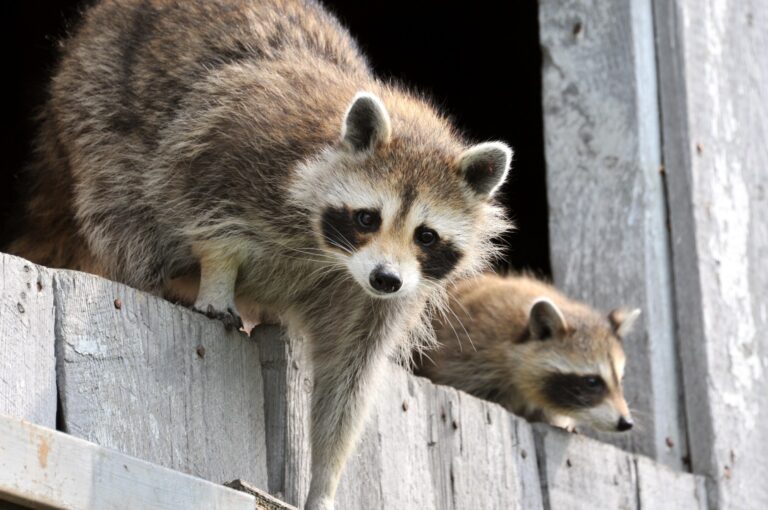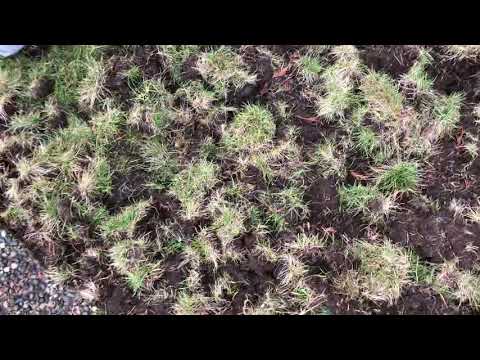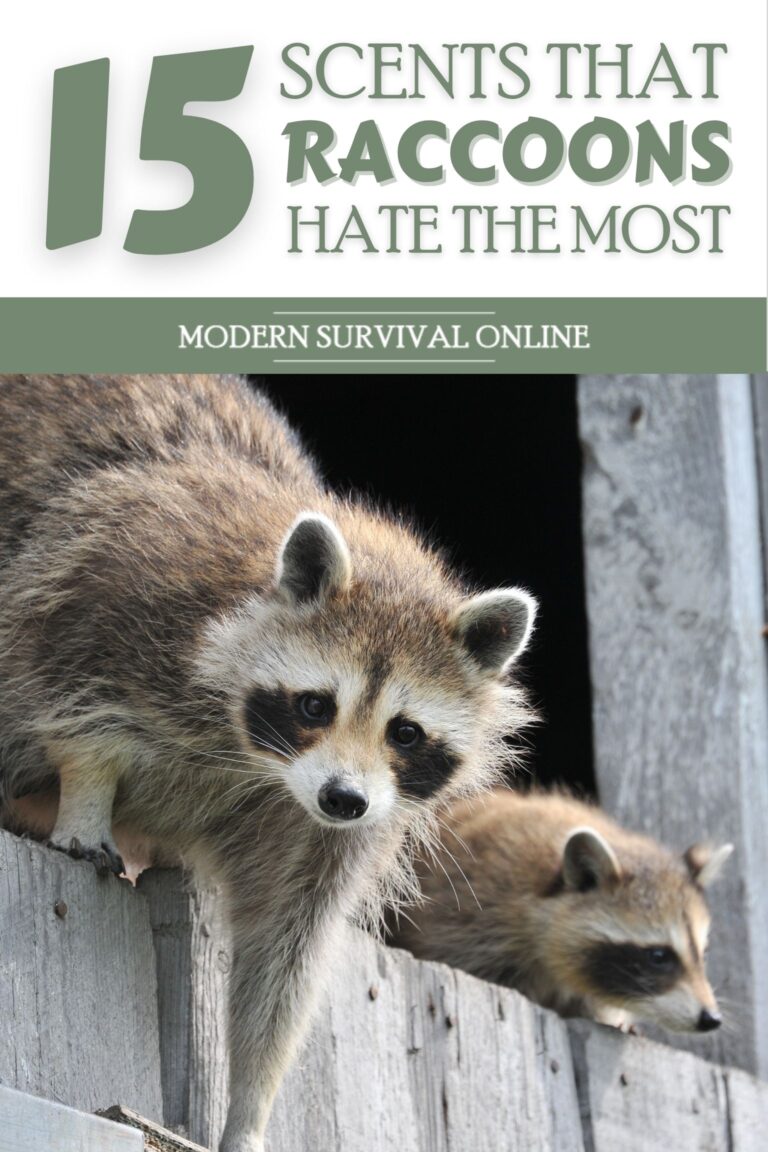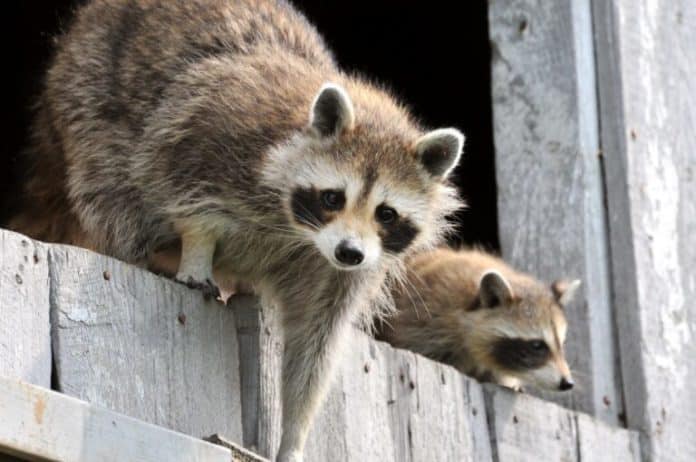If all you know about raccoons is what you’ve learned from internet videos of them acting adorable, you’re in for a rude awakening when they start hanging around your house.

They can break into your trash, infiltrate your attic, and generally make themselves a complete menace.
They also carry a variety of diseases that might affect you and your pets if you come into contact with areas where they’ve been. They might even carry rabies!
There are lots of ways to get rid of raccoons, but it’s not always legal to trap or kill them depending on where you live.
One option that is almost always legal is deterring them through the use of scents that they don’t like.
From man-made chemicals to all-natural ingredients, there are many things that will offend the extremely sensitive noses of raccoons, hopefully sending them in the other direction.
This list will tell you about 15 of them that you can try the next time the little masked bandits are on the prowl.
1. Moth Balls
Mothballs as a raccoon repellent definitely sounds like an old wives’ tale, but I’m happy to report this is one old wives’ tale that is actually true!
Mothballs work to repel raccoons because they contain naphthalene, an organic hydrocarbon derivative that is used in all sorts of other chemicals, namely bug killers.
Now, the naphthalene in moth balls will not harm the raccoons (unless they eat it) but the smell will absolutely knock them for a loop.
These things are pungent, as anyone who has ever smelled them will tell you. When raccoons get a sniff of these things, they are likely to avoid the area entirely.
One of the best things about mothballs is they are commonly available and quite cheap, however, there is the risk that raccoons or other animals may be harmed or killed by them if they do happen to eat them, and of course they will kill insect life indiscriminately.
Place these near areas where raccoons nest or sneak in or onto your property and it should keep them away.

2. Cayenne Pepper
Cayenne pepper is a wonderful raccoon repellent because it functions as a sort of one-two punch: the stuff smells bad to raccoons, for sure, but if they happen to inhale it, even just a little bit, it will light up those super sensitive noses they have.
That’s because cayenne pepper, like all spicy peppers, contains capsaicin, the active ingredient in pepper spray that gives it its name.
Plants use capsaicin as a defense mechanism against mammals, and pretty much all mammals except people avoid stuff like the plague.
If raccoons get too close or press their luck they will be subjected to burning pain, another deterrent that should send them running.
The good news is that the pain is only temporary and causes the little critters no lasting harm.
Sprinkle this stuff wherever you want in an effort to keep raccoons away, but do keep in mind it will lose its potency quickly, and you’ll need to reapply it after it rains.
3. Onion
You might think a nasty, stinky onion sitting in the trash can is just going to work as bait for a raccoon, but you’d be wrong.
This is because the characteristic eye-watering odor of onions comes from organic, sulfurous compounds present in the flesh.
You don’t need me to tell you now that these compounds are generally highly offensive to mammals, and that definitely includes our raccoon pals here.
If you want to try utilizing onions as a raccoon deterrent, all you’ll need to do is carve up a fresh one into slices or chop it up and then scatter them around areas where raccoons come onto your property, nest, or try to find food.
The best thing about onions as they are all-natural and basically harmless, but the bad news is they lose potency pretty quickly as they decay, and you’ll need to replace them periodically.

4. Bleach
Yep, you can choke this up to yet another ingenious use for bleach, though it is one that requires a good bit of caution.
Bleach is indeed an effective raccoon repellent, and much the same way that mothballs are: the stuff is pungent and harmful to the super delicate noses of raccoons.
Accordingly, you can splash it anywhere that the raccoons lay low or hide on your property, or if they have a path that they use to get onto your property regularly you can lay some there in an effort to keep them away.
Bleach has a lot going for it in this regard, because it is commonly available and very cheap. It is also effective.
However, it is dangerous to living things because it is corrosive and toxic, and bleach breaks down quickly meaning you’ll need to replace it regularly.
Accordingly, that means bleach is at its best closer to your home where you can check on it regularly.
5. Apple Cider Vinegar
Apple cider vinegar is perhaps a surprising raccoon repellent, but if you’ve been paying attention this far you’ve likely noticed that I have emphasized just how sensitive raccoons’ noses are.
Yes, they are finely-tuned odor receptors but they are so sensitive that they are also a vulnerability.
The acidity and pungent odor of vinegar are in no way appealing to raccoons and they are likely to avoid it.
Like many other natural things on this list, apple cider vinegar is ultimately harmless, cheap, and widely available, meaning if you are in need of a quick solution you can definitely lead with this and see what happens.
I recommend soaking a rag with it and placing it in a shallow dish or bowl at the target area to help slow down evaporation or absorption into the ground.
But apple cider vinegar also has some drawbacks. It will, as mentioned, evaporate fairly quickly and the worst of the odor can dissipate over time, meaning you’ll need to refresh your supply routinely if you want to maintain protection.

6. Garlic
Garlic is neck-and-neck with onion as a raccoon repellent, and has been proven time and again to keep raccoons and other animals at bay. Sure, we might think that garlic tastes delicious, but raccoons don’t agree.
Garlic, much like onion, does not smell particularly offensive until the flesh is damaged.
This causes a chemical reaction that releases that pungent odor we all know, and some of us love!
To make garlic work you’ll need to slice, crush or grate it to maximize the odor and then place it.
You can’t just hang up a whole garland or bulb of garlic in a place and expect it to keep a raccoon away: they aren’t vampires!
Also, make sure you use fresh stuff to maximize the odor. The pre-minced stuff in the jar of oil doesn’t have the same punch.
Garlic is reasonably cheap, safe, and easy to handle, but like a lot of other natural ingredients on this list, you’ll need to replace it periodically as the odor dissipates.
7. Ammonia
Yet another noxious chemical on our list, and one with proven mammal-repelling qualities.
Ammonia is well known, or you might say infamous, for its pungency and effect on mucous membranes, and as badly as it affects people this means it is going to seriously upset a raccoon.
Now, ammonia is an ingredient in all sorts of household chemicals and cleaning supplies, but you probably don’t want to go spreading those around willy-nilly for this purpose.
A better option is to purchase ammonia from your local home improvement store, and then carefully place a rag or cotton pad soaked with it in the target location on a dish or piece of plastic.
Be very careful when using ammonia in this way. It is reactive and corrosive, and it can hurt you and other animals, including the raccoon or even your very own pets.
This is definitely a step above most of the other things on this list, so if you’re serious about keeping those raccoons away, give this a try.
8. Coyote Urine
Another interesting and disgusting natural option, various predator urines are highly effective raccoon deterrents.
This is because raccoons, like most animals that are preyed on, are extraordinarily aware of anything which might indicate the presence of a predator. This includes the odor of their droppings and urine.
In a way, this is something of a biological terror tactic. When a raccoon smells coyote urine it is going to be on high alert and is likely that they will head in the opposite direction.
This technique works best if you actually live in an area where coyotes are, because I can guarantee you they’ve gotten raccoons before and raccoons know enough to be afraid of them.
You won’t be able to get this just anywhere though, so you should try your local hunting retailer or outdoor store if they are well stocked. If that is an option, you’ll probably have to order it online.
Take care when placing it, because if you get any on you you’ll have to burn your clothes.
9. Peppermint
Peppermint might be a love it or hate it flavor among humans, but when it comes to animals, you’ll find that most decisively hate it- and that includes raccoons.
In an interesting quirk of chemistry, the same compound that gives peppermint that bracing, fresh scent is also a natural insecticide and deterrent for the plant’s predators.
It’s funny when you think about it: many humans like menthol but it is deadly to other animals. Go figure.
Concerning our raccoon pest here, menthol will act as an irritant much like cayenne pepper. It will definitely irritate their noses and can also irritate their eyes if they get too close.
To use peppermint as a deterrent, try to find a highly concentrated essential oil. Crushing up fresh leaves is probably not going to do the trick.
Take the essential oil and splash it around or apply it to cotton balls or rags as with other liquids on this list. At least this is one deterrent that you will enjoy the smell of!
10. Male Raccoon Scent
This is bound to seem strange to some people, but do bear with me: how is the smell of a male raccoon supposed to keep raccoons away?
I’m glad you asked. This actually exploits a known factor of raccoon behavior and is especially effective against female raccoons that are looking for a nesting site or have already nested in or around your house.
Sadly, male raccoons are known to regularly kill baby raccoons and so mommy raccoons know to be very, very afraid of males after mating.
Once mom gets a whiff that tells her dad might be coming home, she’ll pack up the babies and hit the road.
This sounds like an exotic scent for the purpose, but you can actually find it pretty regularly because it is the primary ingredient in what is commonly called “eviction” spray sold for the purpose.
11. Cinnamon
Cinnamon is a wonderful, warm spice and it’s also one of the nicest-smelling raccoon repellents on this list.
But, as nice as it makes our desserts taste a strong dose of it, or worse, inhaling it is going to be a bad time. It will be way worse for a raccoon!
You can use cinnamon just like you would cayenne powder: sprinkle the stuff liberally wherever raccoons come or go, wherever they sleep, where they eat, and so forth.
If they happen to walk through the area and stir the fine powder up into the air, and inhale it, they will probably run for the hills and not come back.
Remember, just like any other powder once it gets wet or blows away it is useless so keep an eye on it and refresh as necessary.
12. Epsom Salt
Another entry on our list that sounds like old-timer wisdom, and that is because it is. But this time those old-timers weren’t pulling your leg. Epsom salt really works to repel raccoons.
This is another interesting case. Epsom salt doesn’t have a smell, does it? Not to people, no, but raccoons can smell it. And that is because it is not salt at all but another naturally occurring mineral compound.
I’ll spare you the chemistry lesson, but suffice it to say that raccoons can detect this stuff well before they reach it and it is highly irritating to them.
Epsom salt is cheap and easy to spread, so you should use this like you would any other powder ingredient on this list.
Or if you prefer you can dilute about a pound of the stuff in a few gallons of water and spray it around the perimeter of your property to form an invisible barrier that most raccoons will not cross.
13. Wolf Urine
Wolf urine is another kind of predator urine that is proven to repel raccoons. Use it as you would coyote urine, but do keep in mind that, for best results, there should actually be wolves in your area that could prey on raccoons.
Don’t expect to find this stuff in just any hunting or outdoor store. Try buying online.
14. Black Pepper
Black pepper, like cayenne pepper, can be a burning irritant to mammals just the same although the burn is caused by a different chemical compound.
This is something that you already have in your pantry, in all likelihood, and it’s also quite cheap when used for this purpose.
It has more benefits in being completely safe and ultimately harmless to the little pests, and even your own pets, so you don’t need to expect any negative consequences or accidents.
But just like every other powder or granule solution we have talked about you’ll need to replace it fairly regularly whenever it is windy or after it has rained because it will lose effectiveness.
Scatter the stuff liberally, and don’t be afraid to pour sizable piles of it where needed. Consider getting a large container for the purpose.
15. Bobcat Urine
The final entry on our list and the last of the predator urine options. And this one is a doozy, let me tell you!
Bobcat urine is not easy to find and it is typically very expensive when you do find it, but it is extraordinarily pungent and highly effective.
This is probably because felines tend to be apex predators, and all of their prey animals rightly fear them.
But, it isn’t a guaranteed solution if you live in an area where bobcats do not regularly kill and eat raccoons.
But if you do, and you want to go straight to the nuclear option, bobcat urine is it. Make sure you hold your breath when you’re dispensing it.



